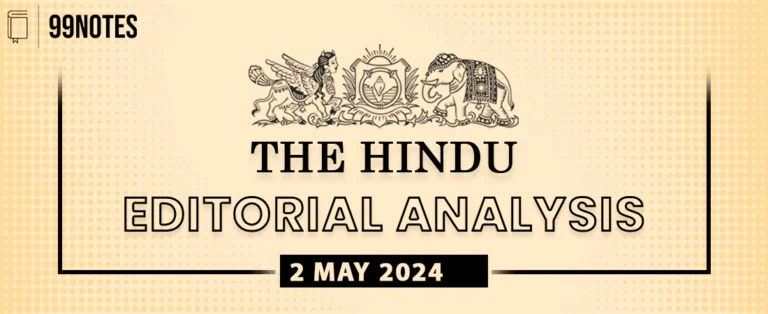1 August 2023 : The Hindu Editorial Notes PDF
The Hindu Editorial
1-August-2023
Daily Current Affairs For UPSC ,The Hindu Editorial Summary
1. In Article 370 hearing, the original text and spirit count.
Topic: GS2 – Indian polity.
Context:
- On August 2, the Supreme Court of India will begin hearing oral arguments on the case concerning Article 370 of the Constitution.
- The changes made to Article 370 commenced with a presidential order issued on August 5 nearly four years ago.
- These changes were seismic and included making the entirety of India’s Constitution applicable to Jammu and Kashmir (J&K) and splitting the state into two Union Territories: J&K and Ladakh.
- The decisions were made when the State was under President’s Rule, with no elected Legislative Assembly in place.
- The Court will focus on the legality of the decisions, not their consequences, and will determine whether they are ultra vires the Constitution.
Article 370 – An instrument with qualifications:
- Article 370 limited Parliament’s legislative power in J&K to matters of external affairs, defense, and communications, and required additional ratification by the State’s Constituent Assembly for other subjects.
- After 1957, J&K’s Constituent Assembly was disbanded, rendering the ratification clause in Article 370 effectively non-operational.
- The Union government sought to alter the arrangement by amending Article 367, which deals with the interpretation of the Constitution.
- A new clause was added to Article 367, stating that “Constituent Assembly of the State” would now refer to the “Legislative Assembly of the State.”
- This amendment effectively abrogated the core of Article 370 without fulfilling the precondition set by its chief drafter, Gopalaswami Ayyangar.
Abrogation of Article 370:
- Jammu and Kashmir (J&K) was under President’s Rule when changes were made to Article 370.
- The President, with the Governor acting as the State’s Legislative and Constituent Assembly, declared that all clauses of Article 370 would cease to be operative.
- The President’s order was made with the concurrence of the J&K Governor, effectively assenting to its own decision without consulting elected representatives.
Issues raised by the petitioners:
- The petitioners argue that representative democracy is a basic feature of the Constitution, and any interpretation should enhance this value.
- The Union government argues that previous presidential orders made provisions of the Constitution applicable to J&K without altering Article 1 or Article 370.
- The petitioners claim that amending Article 370 through changes in Article 367 was an indirect attempt to do what couldn’t be done directly.
The case of asymmetric federalism:
- The case highlights the balance of power between the Union and the States, reflecting asymmetric federalism in India’s governance system.
- The Supreme Court will have to consider not only the text of Article 370 but also the spirit of the Constitution’s basic structure.
- The Court’s decision on the legality of the President’s order will have significant implications for India’s constitutional law and the relationship between the Union and the States.
2. Recalibrating India’s clean-cooking strategy.
Topic: GS3 – clean energy.
Context:
- The Government of India has made significant efforts to promote LPG adoption in rural and poorer households through schemes like the Grameen Vitrak Yojana and Pradhan Mantri Ujjwala Yojana.
Reduction in LPG consumption:
- LPG consumption in Indian households saw a reduction in FY23 after years of steady growth due to global events, such as the COVID-19 pandemic and volatility in crude and product prices.
- Withdrawal of LPG subsidies for all consumers in 2020 and subsequent changes in subsidy policies have impacted LPG consumption rates.
- India’s dependence on imported LPG has increased, and domestic budget constraints make it difficult to continue large subsidies for LPG consumption.
Overcoming the challenges:
- To overcome these challenges, India’s clean cooking policy should pivot towards a diverse range of clean-cooking technologies, not just LPG.
- Electric cooking, including induction cook-tops, can significantly offset the need for flame-based cooking and could be cheaper than LPG even at higher electricity tariffs.
- Shifting urban households to electric cooking can seed the transition in rural areas, creating demand for e-cooking technologies and models and spurring the domestic manufacturing ecosystem.
- Targeted support is needed for manufacturers to embrace efficiency and design suitable e-cooking devices for Indian households.
- Displacing traditional chulhas with e-cooking can avoid climate pollutant release and enable India to monetize avoided emissions through carbon markets to finance the transition to clean cooking.
3. The debate on data
Topic: GS3 – Indian economy..
Context:
- India’s statistical system, once envied by the world, has faced a steady decline in quality and credibility over the years.
Issues with data generation in India:
- The first issue is the quality and credibility of data, crucial for policy formulation and economic research. Household surveys are facing questions about the accuracy and representation of data.
- The second issue is the existence of multiple agencies providing data on the same indicators for the same sector, but giving different numbers, leading to policy formulation challenges.
- The third issue is the competence and ability of the system to generate and disseminate high-quality data. Surveys have been delayed, and publication of processed data has been withheld, hindering the assessment of economic growth and poverty reduction.
Way forward:
- Urgent attention is required to address the non-availability of credible and coherent data on the economy and society, especially with the 2021 Census pending and the need for revised survey methods.
- An overhaul of the system is necessary, with better communication between data creators and users and more transparent data dissemination.
- Revisiting past reports and recommendations, such as the Rangarajan Committee Report (2001), could be a good starting point for improving the statistical system.
For Enquiry

1 August 2023 : The Hindu Editorial Notes PDF

1 August 2023 : Daily Current Affairs

31 July 2023 : Daily Quiz

31 July 2023 : PIB

31 July 2023 : The Hindu Editorial Notes PDF

31 July 2023 : Daily Current Affairs

29 July 2023 : Daily Quiz

29 July 2023 : PIB

29 July 2023 : The Hindu Editorial Notes PDF

29 July 2023 : Daily Current Affairs
The Hindu 1 August 2023 : The Hindu Editorial Notes PDF The Hindu Editorial
1-August-2023
Daily Current Affairs For UPSC ,The Hindu Editorial Summary
Facebook-f
Twitter
Youtube
1. In…
Daily Current Affairs 1 August 2023 : Daily Current Affairs DAILY CURRENT AFFAIRS
Daily Current Affairs For UPSC ,Daily Current affairs of The hIndu and Indian Express.
1-August-2023
Facebook-f
Twitter
Youtube
1. ISRO…
Daily Quiz 31 July 2023 : Daily Quiz 31 July 2023 : Daily Quiz…
PIB 31 July 2023 : PIB PRESS INFORMATION BUREAU
31-July-2023
Daily Current Affairs For UPSC ,The PIB ( Press Information Bureau…
The Hindu 31 July 2023 : The Hindu Editorial Notes PDF The Hindu Editorial
31-July-2023
Daily Current Affairs For UPSC ,The Hindu Editorial Summary
Facebook-f
Twitter
Youtube
1. Supreme…
Daily Current Affairs 31 July 2023 : Daily Current Affairs DAILY CURRENT AFFAIRS
Daily Current Affairs For UPSC ,Daily Current affairs of The hIndu and Indian Express.
31-July-2023
Facebook-f
Twitter
Youtube
1. Hurdles…
Daily Quiz 29 July 2023 : Daily Quiz 29 July 2023 : Daily Quiz…
PIB 29 July 2023 : PIB PRESS INFORMATION BUREAU
29-July-2023
Daily Current Affairs For UPSC ,The PIB ( Press Information Bureau…
The Hindu 29 July 2023 : The Hindu Editorial Notes PDF The Hindu Editorial
29-July-2023
Daily Current Affairs For UPSC ,The Hindu Editorial Summary
Facebook-f
Twitter
Youtube
1. Charting…
Daily Current Affairs 29 July 2023 : Daily Current Affairs DAILY CURRENT AFFAIRS
Daily Current Affairs For UPSC ,Daily Current affairs of The hIndu and Indian Express.
29-July-2023
Facebook-f
Twitter
Youtube
1. SC…


